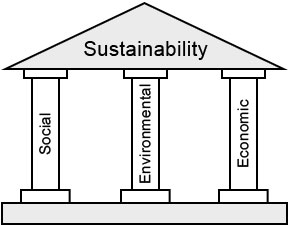3.4 What is sustainability?
In general, sustainability can be defined as the ability of something to sustain itself or be sustained over time, but a more complete definition for our discussion is that sustainability is an approach that combines environmental, economic and social aspects to produce long-lasting development or prosperity. These three aspects – environmental, economic and social – are the pillars of sustainability (Figure 3.5).

The economic pillar of sustainability is the efficient and responsible use of resources such as land, labour, capital and technology to create affordable goods and services with good value for money. The environmental pillar consists of implementing best practices that minimise the environmental impacts, such as using renewable energy to reduce the emission of greenhouse gases or minimising production of waste. The social pillar is about meeting the needs of all people or improving the quality of life for all members of society by better access to health care and education, and reducing poverty.
The central idea of sustainability is that all three pillars must be taken into consideration because without all three, the ‘building’ will collapse. For example, focusing only on economic growth without considering environmental impacts would not bring long-lasting profits if that growth depends on consumption of finite, non-renewable resources.
Name the non-renewable resources that humans use to provide energy.
You may have mentioned oil, coal, or gas.
Focusing on economic growth without addressing social problems such as poverty and unemployment will also be unsustainable. For example, when unemployment and poverty are very high, it means people do not have adequate money to meet their basic needs for food, shelter and clothing. This may lead to crime and unrest. If there are high crime levels and instability in a country, investors will be reluctant to invest and educated people may leave the country in search of a better life. The result is a negative impact on economic growth.
Similarly, just focusing on the environment may not ultimately protect it.Environmental sustainability needs both economic growth and social development, which may include changes in the structure of the economy and the way in which its benefits are distributed. For example, without opportunities for advancement, poor people will not have the options to use alternative energy sources and environmentally-friendly technologies so they are more likely to degrade the environment, for example, by cutting down trees for fuel.
3.3 Sustainable development
